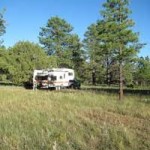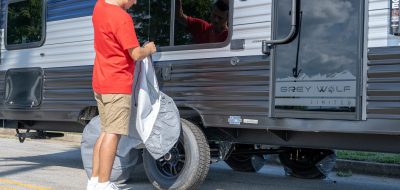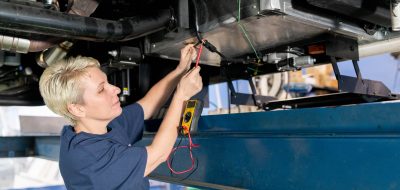After you bought your first RV, did you feel like you had to learn a new language to understand the lingo you were now hearing from your fellow RVers?
You’re not alone. As in nearly every sport, occupation, or lifestyle – including the RV lifestyle – new words pop up that you’ve never heard before and familiar words sometimes take on new meanings.
So, to ease your way into the RV Lifestyle, I’ve attempted to take the mystery out of some of the more common RV jargon, RV lingo, and RV clichés. Read on.
- Basement – Storage area beneath the floor of a motorhome, accessible from the outside and sometimes through an internal trap door.
- Boondocking (or Dry Camping) – Camping without hooking up to an external electric, sewer, or water source, using electricity from the RV’s batteries, solar panels, wind turbine, or generator, using internal tanks for waste, and water from a fresh water holding tank.
- Blue Boy – A portable wheeled plastic tote used to transport waste tank sewage (when no sewer hookup is available) from the RV to a dump station, usually towed at slow speed by the tow vehicle.
- Dinghy (or Toad) – Drivable vehicle towed behind a motorhome.
- Dually – A Truck with 4 rear wheels.
- Fifth wheel (or Fiver) – A non-motorized RV towed by a pickup truck with the hitch mounted in the bed of the truck directly over the rear axle.
- Travel (or vacation) trailer – A non-motorized RV towed by its front hitch by a car or truck with a ball hitch.
- Class A motorhome – A drivable bus type RV built from the chassis up.
- Diesel Pusher – Class “A” or bus type motorhome with the diesel engine mounted in the rear.
- Class C motorhome – A drivable RV built on a cut-away van chassis with an extension over the cab.
- Class B motorhome – A drivable RV built by customizing a van, usually with a raised roof.
- Mobile home – A trailer built on wheels that can be towed (with a big commercial truck) to a trailer park where it usually stays for its useful life.
- Galley – Kitchen.
- Workamping (includes camp-hosting and volunteering) – RVers exchanging work for a free campsite, utilities, and possibly a small wage, such as in forest service campgrounds and state and national parks.
- Snowbirds – Those who live in their RV in the south during the winter months and move north in the summer time.
- Gross Combined Weight Rating (GCWR) – The manufacturer’s maximum load weight, in pounds, allowed for the trailer and tow vehicle. This rating includes the weight of the trailer, tow vehicle, fuel, water, propane, supplies and passengers.
- Gross Vehicle Weight Rating (GVWR) – The manufacturer’s maximum load weight, in pounds, allowed for the vehicle. This rating includes the weight of the vehicle plus fuel, water, propane, supplies and passengers.
- Net Carrying Capacity (NCC) (or Payload Capacity) – The maximum weight of fuel, water, propane, supplies and passengers that can be added to an RV without exceeding the Gross Vehicle Weight Rating (GVWR).






Newby Fun Resorts
So much to learn! Getting an RV is so much fun, and so is learning the lingo!